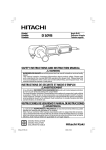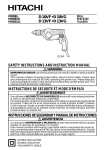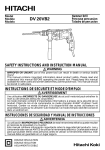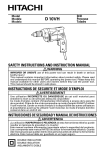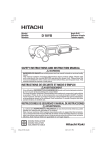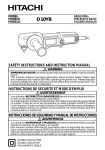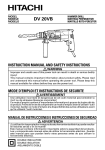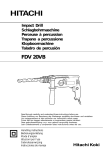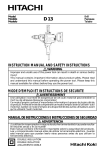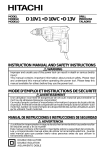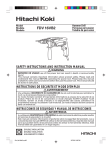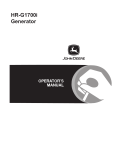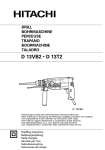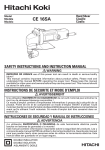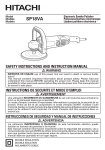Download John Deere ET-3506-J User's Manual
Transcript
ET-3505-J 1/2-INCH AND ET-3506-J 3/8-INCH DRILL CAUTION RISK OF INJURY! READ MANUAL BEFORE OPERATING! THIS MANUAL IS AN IMPORTANT PART OF THE DRILL AND SHOULD REMAIN WITH THIS UNIT WHEN YOU SELL OR RENT IT. 1/2-Inch and 3/8-Inch Drill Operator's Manual 1 Introduction Congratulations on the purchase of your new drill! You can be assured your drill was constructed and designed with quality and performance in mind. Each component has been rigorously tested to ensure the highest level of acceptance. This operator's manual was compiled for your benefit. By reading and following the simple safety, installation, operation, maintenance and troubleshooting steps described in this manual, you will receive years of trouble-free operation from your new drill. The contents of this manual are based on the latest product information available at the time of publication. The manufacturer reserves the right to make changes in price, color, materials, equipment, specifications or models at any time without notice. Once the unit has been removed from the box, immediately write in the serial number of your unit in the space provided below. SERIAL NUMBER_________________________________ Inspect for signs of obvious or concealed freight damage. If damage does exist, file a claim with the transportation company immediately. Be sure that all damaged parts are replaced and that the mechanical problems are corrected prior to operation of the unit. If you require service, contact your Customer Service. Mi-T-M® Corporation, 8650 Enterprise Drive, Peosta, IA 52068 1-877-JD-KLEEN / (1-877-535-5336) Fax 563-556-1235 Monday - Friday 8:00 a.m. - 5:00 p.m. CST Please have the following information available for all service calls: 1. Model Number 2. Serial Number 3. Date and Place of Purchase WARNING WEAR RESPIRATORY PROTECTION Some dust created by power sanding, sawing, grinding, drilling and other construction activities contain chemicals known to the State of California to cause cancer, birth defects or other reproductive harm. Some examples of these chemicals are: • Lead from lead-base paints, • Crystalline Silica from bricks, cement and other masonry products, and • Arsenic and Chromium from chemically-treated lumber. Your risk from these exposures varies, depending on how often you do this type of work. To reduce your exposure to these chemicals, work in a well ventilated area and work with approved safety equipment, such as those dust masks that are specially designed to filter out microscopic particles. 2 1/2-Inch and 3/8-Inch Drill Operator's Manual Table of Content SAFETY .................................................................................................................. 4-8 GENERAL SAFETY RULES .................................................................. 4-8 FUNCTIONAL DESCRIPTION ............................................................................... MODEL ................................................................................................... NAME OF PARTS .................................................................................. SPECIFICATIONS ................................................................................. 9 9 9 9 OPERATION ........................................................................................................... APPLICATIONS ..................................................................................... PRE-OPERATION ................................................................................. OPERATION .......................................................................................... 10-12 10 10-11 12 MAINTENANCE AND INSPECTION ..................................................................... MAINTENANCE AND INSPECTION ..................................................... SERVICE AND REPAIRS ...................................................................... MODIFICATIONS ................................................................................... STANDARD ACCESSORIES ................................................................ 13-14 13 13 13 14 NOTES ................................................................................................................... 15 FRENCH ................................................................................................................. 16-29 SPANISH ................................................................................................................ 30-43 1/2-Inch and 3/8-Inch Drill Operator's Manual 3 Safety RECOGNIZE SAFETY INFORMATION This is the safety alert symbol. When you see this symbol on your tool or in this manual, be alert to the potential for personal injury. Follow recommended precautions and safe operating practices. UNDERSTAND SIGNAL WORDS A "DANGER, WARNING or CAUTION" safety warning will be surrounded by a "SAFETY ALERT BOX." This box is used to designate and emphasize Safety Warnings that must be followed when operating this tool. Accompanying the Safety Warnings are "signal words" which designate the degree or level of hazard seriousness. The "signal words" used in this manual are as follows: DANGER: Indicates an imminently hazardous situation which, if not avoided, WILL result in death or serious injury. WARNING: Indicates a potentially hazardous situation which, if not avoided, COULD result in death or serious injury. CAUTION: Indicates a potentially hazardous situation which, if not avoided MAY result in minor or moderate injury. GENERAL SAFETY RULES WARNING: Read and understand all instructions. Failure to follow all instructions listed below, may result in electric shock, fire and/ or serious personal injury. SAVE THESE INSTRUCTIONS 4 1/2-Inch and 3/8-Inch Drill Operator's Manual WARNING KEEP YOUR WORK AREA CLEAN AND WELL LIT. Cluttered benches and dark areas invite accidents. DO NOT OPERATE POWER TOOLS IN EXPLOSIVE ATMOSPHERES, SUCH AS IN THE PRESENCE OF FLAMMABLE LIQUIDS, GASES, OR DUST. Power tools create sparks which may ignite the dust of fumes. KEEP BYSTANDERS CHILDREN, AND VISITORS AWAY WHILE OPERATING A POWER TOOL. Distractions can cause you to lose control. ELECTRICAL SAFETY DOUBLE INSULATED TOOLS ARE EQUIPPED WITH A POLARIZED PLUG (ONE BLADE IS WIDER THAN THE OTHER.) THIS PLUG WILL FIT IN A POLARIZED OUTLET ONLY ONE WAY. IF THE PLUG DOES NOT FIT FULLY IN THE OUTLET, REVERSE THE PLUG. IF IT STILL DOES NOT FIT, CONTACT A QUALIFIED ELECTRICIAN TO INSTALL A POLARIZED OUTLET. DO NOT CHANGE THE PLUG IN ANY WAY. Double Insulation eliminates the need for the three wire grounded power cord and grounded power supply system. AVOID BODY CONTACT WITH GROUNDED SURFACES SUCH AS PIPES, RADIATORS, RANGES AND REFRIGERATORS. There is an increased risk of electric shock if your body is grounded. DO NOT EXPOSE POWER TOOLS TO RAIN OR WET CONDITIONS. Water entering a power tool will increase the risk of electric shock. DO NOT ABUSE THE CORD. NEVER USE THE CORD TO CARRY THE TOOLS OR PULL THE PLUG FROM A RECEPTACLE. KEEP CORD AWAY FROM HEAT, OIL, SHARP EDGES OR MOVING PARTS. REPLACE DAMAGED CORDS IMMEDIATELY. Damaged cords increase the risk of electric shock. WHEN OPERATING A POWER TOOL OUTSIDE, USE AN OUTDOOR EXTENSION CORD MARKED “W-A” OR “W”. These cords are rated for outdoor use and reduce the risk of electric shock. 1/2-Inch and 3/8-Inch Drill Operator's Manual 5 WARNING PERSONAL SAFETY STAY ALERT, WATCH WHAT YOU ARE DOING AND USE COMMON SENSE WHEN OPERATING A POWER TOOL. DO NOT USE TOOL WHILE TIRED OR UNDER THE INFLUENCE OF DRUGS, ALCOHOL, OR MEDICATION. A moment of inattention while operating power tools may result in serious personal injury. DRESS PROPERLY. DO NOT WEAR LOOSE CLOTHING OR JEWELRY. CONTAIN LONG HAIR. KEEP YOUR HAIR, CLOTHING AND GLOVES AWAY FROM MOVING PARTS. Loose clothes, jewelry, or long hair can be caught in moving parts. Avoid accidental starting. Be sure switch is off before plugging in. Carrying tools with your finger on the switch or plugging in tools that have the switch on invites accidents. Remove adjusting keys or wrenches before turning the tool on. A wrench or a key that is left attached to a rotating part of the tool may result in personal injury. DO NOT OVERREACH. KEEP PROPER FOOTING AND BALANCE AT ALL TIMES. Proper footing and balance enables better control of the tool in unexpected situations. USE SAFETY EQUIPMENT. ALWAYS WEAR PROTECTIVE GLASSES. Dust mask, nonskid safety shoes, hard hat, or ear plugs must be used for appropriate conditions. TOOL USE AND CARE USE CLAMPS OR OTHER PRACTICAL WAY TO SECURE AND SUPPORT THE WORKPIECE TO A STABLE PLATFORM. Holding the work by hand or against your body is unstable and may lead to loss of control. DO NOT FORCE TOOL. USE THE CORRECT TOOL FOR YOUR APPLICATION. The correct tool will do the job better and safer at the rate for which it is designed. DO NOT USE TOOL IF SWITCH DOES NOT TURN IT ON OR OFF. Any tool that cannot be controlled with the switch is dangerous and must be repaired. DISCONNECT THE PLUG FROM THE POWER SOURCE BEFORE MAKING ANY ADJUSTMENTS, CHANGING ACCESSORIES, OR STORING THE TOOL. Such preventive safety measures reduce the risk of starting the tool accidentally. STORE IDLE TOOLS OUT OF REACH OF CHILDREN AND OTHER UNTRAINED PERSONS. Tools are dangerous in the hands of untrained users. MAINTAIN TOOLS WITH CARE. KEEP CUTTING TOOLS SHARP AND CLEAN. Properly maintained tools, with sharp cutting edges are less likely to bind and are easier to control. CHECK FOR MISALIGNMENT OR BINDING OF MOVING PARTS, BREAKAGE OF PARTS, AND ANY OTHER CONDITION THAT MAY AFFECT THE TOOL'S OPERATION. IF DAMAGED, HAVE THE TOOL SERVICED BY A JOHN DEERE AUTHORIZED SERVICE CENTER BEFORE USING. Many accidents are caused by poorly maintained tools. USE ONLY ACCESSORIES THAT ARE RECOMMENDED BY THE MANUFACTURER FOR YOUR MODEL. Accessories that may be suitable for one tool, may become hazardous when used with another tool. SPECIFIC SAFETY RULES AND SYMBOLS 1. HOLD TOOLS BY INSULATED GRIPPING SURFACES WHEN PERFORMING AN OPERATION WHERE THE CUTTING TOOL MAY CONTACT HIDDEN WIRING OR ITS OWN CORD. Contact with a “live” wire will make exposed metal parts of the tool “live” and shock the operator. 2. ALWAYS wear ear plugs when using the tool for extended periods. Prolonged exposure to high intensity noise can cause hearing loss. 3. NEVER touch the tool bit with bare hands after operation. 4. NEVER wear gloves made of material liable to roll up such as cotton, wool, cloth or string, etc 6 1/2-Inch and 3/8-Inch Drill Operator's Manual WARNING SPECIFIC SAFETY RULES AND SYMBOLS (CONTINUED) 5. For ET-3506-J: ALWAYS securely grip the Drill. For ET-3505-J: ALWAYS attach the side handle and securely grip the Drill. 6. NEVER touch moving parts. NEVER place your hands, fingers or other body parts near the tool’s moving parts. 7. NEVER operate without all guards in place. NEVER operate this tool without all guards or safety features in place and in proper working order. If maintenance or servicing requires the removal of a guard or safety feature, be sure to replace the guard or safety feature before resuming operation of the tool. 8. Use right tool. Don’t force small tool or attachment to do the job of a heavy-duty tool. Don’t use tool for purpose not intended —for example— don’t use circular saw for cutting tree limbs or logs. 9. NEVER use a power tool for applications other than those specified. NEVER use a power tool for applications other than those specified in the Instruction Manual. 10. Handle tool correctly. Operate the tool according to the instructions provided herein. Do not drop or throw the tool. NEVER allow the tool to be operated by children, individuals unfamiliar with its operation or unauthorized personnel. 11. Keep all screws, bolts and covers tightly in place. Keep all screws, bolts, and plates tightly mounted. Check their condition periodically. 12. Do not use power tools if the plastic housing or handle is cracked. Cracks in the tool’s housing or handle can lead to electric shock. Such tools should not be used until repaired. 13. Blades and accessories must be securely mounted to the tool. Prevent potential injuries to youself or others. Blades, cutting implements and accessories which have been mounted to the tool should be secure and tight. 14. Keep motor air vent clean. The tool’s motor air vent must be kept clean so that air can freely flow at all times. Check for dust build-up frequently. 15. Operate power tools at the rated voltage. Operate the power tool at voltages specified on its nameplate. If using the power tool at a higher voltage than the rated voltage, it will result in abnormally fast motor revolution and may damage the unit and the motor may burn out. 16. NEVER use a tool which is defective or operating abnormally. If the tool appears to be operating unusually, making strange noises, or otherwise appears defective, stop using it immediately and arrange for repairs by an authorized JOHN DEERE DEALER. 17. NEVER leave tool running unattended. Turn power off. Don’t leave tool until it comes to a complete stop. 18. Carefully handle power tools. Should a power tool be dropped or struck against hard materials inadvertently, it may be deformed, cracked, or damaged. 1/2-Inch and 3/8-Inch Drill Operator's Manual 7 WARNING SPECIFIC SAFETY RULES AND SYMBOLS (CONTINUED) 19. DO NOT WIPE PLASTIC PARTS WITH SOLVENT. Solvents such as gasoline, thinner benzine, carbon tetrachloride, and alcohol may damage and crack plastic parts. Do not wipe them with such solvents. Wipe plastic parts with a soft cloth lightly dampened with soapy water and dry thoroughly. 20. ALWAYS wear eye protection that meets the requirement of the latest revision of ANSI Standard Z87.1. 21. ALWAYS be careful with buried objects such as under ground wiring. Touching active wiring or electric cable with this tool, may cause an electric shock. Confirm if there are any buried objects such as electric cable within the wall, floor or ceiling where you are going to operate here after. 22. Definitions for symbols used on this tool Volts = V Hertz = Hz Amperes = A No load speed = no Watt = W Class II Construction = Revolutions per minute = ---/min CAUTION DOUBLE INSULATION FOR SAFER OPERATION To ensure safer operation of this power tool, JOHN DEERE has adopted a double insulation design. “Double insulation “ means that two physically separated insulation systems have been used to insulate the electrically conductive materials connected to the power supply from the outer frame handled by the operator. Therefore, either the symbol “ ” or the words “Double insulation” appear on the power tool or on the nameplate. Although this system has no external grounding, you must still follow the normal electrical safety precautions given in this Instruction Manual, including not using the power tool in wet environments. To keep the double insulation system effective, follow these precautions: a. Only JOHN DEERE AUTHORIZED DEALER should disassemble or assemble this power tool, and only genuine JOHN DEERE replacement parts should be installed. b. Clean the exterior of the power tool only with a soft cloth moistened with soapy water, and dry thoroughly. Never use solvents, gasoline or thinners on plastic components; otherwise the plastic may dissolve. SERVICE TOOL SERVICE MUST BE PERFORMED ONLY BY A JOHN DEERE AUTHORIZED SERVICE CENTER. Service or maintenance performed by unqualified personnel could result in a risk of injury. WHEN SERVICING A TOOL, USE ONLY IDENTICAL REPLACEMENT PARTS. FOLLOW INSTRUCTIONS IN THE MAINTENANCE SECTION OF THIS MANUAL. Use of unauthorized parts or failure to follow Maintenance Instruction may create a risk of electric shock or injury. SAVE THESE INSTRUCTIONS AND MAKE THEM AVAILABLE TO OTHER USERS AND OWNERS OF THIS TOOL! 8 1/2-Inch and 3/8-Inch Drill Operator's Manual Functional Description NOTE: The information contained in this Instruction Manual is designed to assist you in the safe operation and maintenance of the power tool. NEVER operate, or attempt any maintenance on the tool unless you have first read and understood all safety instructions contained in this manual. Some illustrations in this Instruction Manual may show details or attachments that differ from those on your own power tool. MODEL: ET-3505-J ET-3506-J NAME OF PARTS: 1/2-Inch Drill (ET-3505-J) 3/8-Inch Drill (ET-3506-J) SPECIFICATIONS: Drill ET-3505-J and ET-3506-J: Model Motor Power Source Current No-Load Speed Drill Chuck Capacity Electric Brake Capacity: SteelTwist Bit Hole Saw WoodFlat Spade Bit Auger Bit Self Feed Bit Hole Saw Weight (without cord) (Fig. 1) ET-3505-J ET-3506-J Single Phase, Series Commutator Motor Single Phase 120V AC 60 Hz 9.0A 0-850/min. 0-3000/min 1/2" (13mm) 3/8" (10mm) Yes No 1/2" (13mm) 2" (51mm) 3/8" (10mm) — 1-1/2" (38mm) 1-1/4" (32mm) 2-1/8" (54mm) 4" (102mm) 4.6 lbs (2.1kg) 1" (25mm) — — 1-1/8" (29mm) 4.0 lbs (1.8kg) 1/2-Inch and 3/8-Inch Drill Operator's Manual 9 Operation APPLICATIONS: Boring holes in metal, wood and plastic. PRE-OPERATION: 1. Power source: Ensure that the power source to be utilized conforms to the power source requirements specified on the product nameplate. 2. Power switch: Ensure that the switch is in the OFF position. If the plug is connected to a receptacle while the switch is in the ON position, the power tool will start operating immediately and can cause serious injury. 3. Extension cord: When the work area is far away from the power source, use an extension cord of sufficient thickness and rated capacity. The extension cord should be kept as short as possible. WARNING: DAMAGED CORD MUST BE REPLACED OR REPAIRED. 4. Check the receptacle: If the receptacle only loosely accepts the plug, the receptacle must be repaired. Contact a licensed electrician to make appropriate repairs. If such a faulty receptacle is used, it may cause overheating, resulting in a serious hazard. 5. Check your work environment: Confirm that the work site is placed under appropriate conditions conforming to prescribed precautions. 6. Selecting the appropriate drill bit: a. When boring metal or plastic, use an ordinary metalworking drill bit. b. When boring wood, use an ordinary woodwork ing drill bit. However, when drilling 1/4" (6.5 mm) or smaller holes, use a metalworking drill bit. 10 1/2-Inch and 3/8-Inch Drill Operator's Manual Operation PRE-OPERATION (CONTINUED): 7. Mounting and dismounting of the bit (Fig. 2) a. Open the chuck jaws, and insert the bit into the chuck. b. Place the chuck wrench in each of the three holes in the chuck, and turn it in the clockwise direction (viewed from the front side). Tighten securely. c. To remove the bit, place the chuck wrench into one of the holes in the chuck and turn it in the counterclockwise direction. 8. Installing the side handle for ET-3505-J: A Side handle is supplied with drill. It can be installed on either side of the tool for right or left handed use. To install the side handle, thread it into the socket on the desired side of the tool and tighten it securely. (Fig. 3) 9. Check the rotational direction (Fig. 4) The bit rotates clockwise (viewed from the rear side) by pushing the R-side of the push button. The L-side of the push button is pushed to turn the bit counterclockwise. (The (L) and (R) marks are provided on the body.) (Fig. 2) (Fig. 3) (Fig. 4) 1/2-Inch and 3/8-Inch Drill Operator's Manual 11 Operation OPERATION: CAUTION: TO PREVENT ACCIDENTS, MAKE SURE TO TURN THE SWITCH OFF AND DISCONNECT THE PLUG FROM THE RECEPTACLE WHEN THE DRILL BITS AND OTHER VARIOUS PARTS ARE INSTALLED OR REMOVED. THE POWER SWITCH SHOULD ALSO BE TURNED OFF DURING A WORK BREAK AND AFTER WORK. 1. Switch operation: a. When the trigger switch is depressed, the tool rotates. When the trigger is released, the tool stops. b. The rotational speed of the drill can be controlled by varying the amount that the Trigger switch is pulled. Speed is low when the trigger switch is pulled slightly and increases as the trigger switch is pulled more. c. Pulling the trigger and pushing the stopper, it keeps the switched-on condition which is convenient for continuous running. When switching off, the stopper can be disconnected by pulling the trigger again. 2. Electric brake (ET-3505-J): When releasing the trigger of the switch, the brake will be applied for immediate stopping. CAUTION: AS THERE IS SOME REACTION WHEN THE BRAKE FUNCTIONS, BE SURE TO HOLD THE DRILL SECURELY. WHEN THE BRAKE BECOMES INEFFECTIVE, SEND THE TOOL TO AN AUTHORIZED JOHN DEERE DEALER. 3. 12 Drilling: a. When drilling, start the drill slowly, and gradually increasing speed as you drill. b. Always apply pressure in a straight line with the bit. Use enough pressure to keep drilling, but do not push hard enough to stall the motor or deflect the bit. c. To minimize stalling or breaking through the material, reduce pressure on drill and ease the bit through the last part of the hole. d. If the drill stalls, release the trigger immediately, remove the bit from the work and start again. Do not click the trigger on and off in an attempt to start a stalled drill. This can damage the drill. e. The larger the drill bit diameter, the larger the reactive force on your arm. Be careful not to lose control of the drill because of this reactive force. To maintain firm control, establish a good foothold, use side handle, hold the drill tightly with both hands, and ensure that the drill is vertical to the material being drilled. 1/2-Inch and 3/8-Inch Drill Operator's Manual Maintenance and Inspection MAINTENANCE AND INSPECTION: WARNING: BE SURE TO SWITCH POWER OFF AND DISCONNECT THE PLUG FROM THE RECEPTACLE DURING MAINTENANCE AND INSPECTION. 1. Inspecting the drill bits: Since use of a dull tool will cause motor malfunctioning and degraded efficiency, replace the drill bit with a new one or resharpening without delay when abrasion is noted. 2. Inspecting the screws: Regularly inspect all screws and ensure that they are fully tightened. Should any of the screws be loosened, retighten them immediately. WARNING: USING THIS DRILL WITH LOOSENED SCREWS IS EXTREMELY DANGEROUS. 3. Keeping after use: When not in use, the Power tool should be kept in a dry place out of the reach of children. 4. Inspecting the carbon brushes: For your continued safety and electrical shock protection, carbon brush inspection and replacement on this tool should ONLY be performed by an AUTHORIZED JOHN DEERE DEALER. 5. Maintenance of the motor: The motor unit winding is the very “heart”’ of the power tool. Exercise due care to ensure the winding does not become damaged and/or wet with oil or water. SERVICE AND REPAIRS: All quality power tools will eventually require servicing or replacement of parts because of wear from normal use. To assure that only authorized replacement parts will be used, all service and repairs must be performed by an AUTHORIZED JOHN DEERE DEALER, ONLY. MODIFICATIONS: JOHN DEERE Power Tools are constantly being improved and modified to incorporate the latest technological advancements. Accordingly, some parts (i.e. code numbers and/or design) may be changed without prior notice. 1/2-Inch and 3/8-Inch Drill Operator's Manual 13 Maintenance and Inspection STANDARD ACCESSORIES: WARNING: ALWAYS USE ONLY AUTHORIZED JOHN DEERE REPLACEMENT PARTS AND ACCESSORIES. NEVER USE REPLACEMENT PARTS OR ACCESSORIES WHICH ARE NO INTENDED FOR USE WITH THIS TOOL. CONTACT JOHN DEERE IF YOU ARE NOT SURE WHETHER IT IS SAFE TO USE A PARTICULAR REPLACEMENT PART OR ACCESSORY WITH YOUR TOOL. THE USE OF ANY OTHER ATTACHMENT OR ACCESSORY CAN BE DANGEROUS AND COULD CAUSE INJURY OR MECHANICAL DAMAGE. ET-3505-J: 1. Side Handle 2. Chuck Wrench 1 1 ET-3506-J: 1. Chuck Wrench 1 NOTE: 14 Accessories are subject to change without any obligation on the part of JOHN DEERE. 1/2-Inch and 3/8-Inch Drill Operator's Manual Notes Manuel Opérateur 15 Introduction Félicitations de l'achat de votre nouveau la clé à outil! Vous pouvez être assuré que votre nouveau la outil a été construit avec le plus haut niveau de précision et de fiabilité. Chaque composant a été rigoureusement testé par des techniciens pour assurer la qualité, la durabilité et la performance de ce outil. Ce manuel opérateur a été dressé pour que vous en retiriez le meilleur parti. Par la lecture et l'application des mesures simples de sécurité, d'installation et d'opération, d'entretien et de dépannage décrites dans ce manuel, votre nouveau outil. Fonctionnera sans faille pendant de nombreuses années. Le contenu de ce manuel est basé sur la dernière information disponible du produit au moment de la publication. Félicitations se réserve le droit d'effectuer des changements de prix, de couleur, de matériaux, d'équipement, de caractéristiques ou de modèles à tout moment sans communication préalable. Une fois l'appareil déballé, écrivez immédiatement le numéro de série de votre appareil dans l'espace çidessous. NUMÉRO DE SÉRIE_________________________________ Assurez vous qu'il n'y a pas de signes de dommages évidents ou cachés suite au transport. En cas de dommage, remplissez immédiatement une réclamation avec la compagnie de transport. Assurez vous que toutes les pièces endommagées sont remplacees et les problémes mécaniques et électriques corrigés avant l'utilisation de l'appareil. Si vous avez besoin d'assistance, entrez en contact avec votre service clientèle. Mi-T-M® Corporation, 8650 Enterprise Drive, Peosta, IA 52068-0050 Tél.: JD-KLEEN (1-877-535-5336) Fax 563-556-1235 du lundi au vendredi de 8h00 à 17h, CST (heure centrale) Veuillez avoir les informations suivantes disponibles pour toute intervention: 1. Numéro de modèle 2. Numéro de série 3. Date et lieu d'achat ADVERTISSEMENT LE PORT D’UNE PROTECTION RESPIRATOIRE EST RECOMMANDÉ Certaines poussières produites par le sablage, le sciage, le broyage, le perçage, et autres activités de construction contiennent des produits chimiques connus par l'Etat de Californie pour cause de cancer, de défauts de naissance ou de problèmes de reproduction. Des exemples de ces produits chimiques sont: • • • Du plomb provenant de peintures à base de plomb. De la silice de Crystalline provenant de briques, de ciment et d’autres produits de maçonnerie. De l’arsenic et du chrome provenant de bois de charpente traité chimiquement. Votre risque de ces contacts varie selon le temps passé à faire ce genre de travail. Pour réduire votre exposition à ces produits chimiques, travailler dans un endroit bien aéré et avec un équipement de sécurité approuvé tels que les masques de poussière conçus spécialement pour filtrer les particules microscopiques. 16 Manuel Opérateur Table Des Matieres SÉCURITÉ .............................................................................................................. 18-23 SIGNIFICATION DES MOTS D’AVERTISSEMENT ............................. 18-23 DESCRIPTION FONCTIONNELLE ....................................................................... MAQUETTE ........................................................................................... NOM DES PARTIES .............................................................................. UTILISATIONS ....................................................................................... SPECIFICATIONS ................................................................................. 24 24 24 24 24 UTILISATION ......................................................................................................... ACCESSOIRES STANDARD ................................................................ AVANT L'UTILISATION ......................................................................... UTILISATION ......................................................................................... 25-27 25 25-26 27 ENTRETIEN ET INSPECTIONS ............................................................................ ENTRETIEN ET INSPECTIONS ........................................................... ENTRETIEN ET RÉPARATION ............................................................ MODIFICATIONS ................................................................................... ACCESSOIRES STANDARD ................................................................ 28-29 28 28 28 29 Manuel Opérateur 17 Sécurité RECONNAÎTRE LES SYMBOLES DE MISE EN GARDE Voici le symbole de mise en garde. Lorsqu'il apparaît sur la outil ou dans la présente publication, c'est pour prévenir d'un risque potentiel de blessure. Respecter tous les conseil de sécurité ainsi que les consignes générales de prévention des accidents. COMPRENDRE LES TERMES DE MISE EN GARDE Les avertissements de sécurité "DANGER, AVERTISSEMENT ou ATTENTION" seront entourés par un "ENCADRE ALERTE SECURITE".Cet encadré est utilisé pour indiquer et souligner les avertissements de sécurité qui doivent être suivis en actionnant d'outils. En plus des avertissements de sécurité, des "mots d'alerte" sont utilisés pour indiquer le degré ou niveau de risque. Les "mots d'alerte" utilisés dans ce manuel sont comme suit: DANGER AVERTISSEMENT ATTENTION DANGER: Indique une situation au danger imminent qui, si elle n'est pas évitée, ENTRAINERA la mort ou des blessures graves. AVERTISSEMENT: Indique une situation potentiellement dangereuse qui, si elle n'est pas évitée, POURRAIT entraîner la mort ou des blessures graves. ATTENTION: Indique une situation potentiellement dangereuse, qui, si elle n'est pas évitée, PEUT entraîner des blessures mineures ou peu graves et des dégats au compresseur. REGLES GENERALE DE SECURITE AVERTISSEMENT: Lire et coxmprendre toutes les instructions. Un non respect de toutes les intrucitons ci-dessous peut entraîner une électrocution, un incedie et/ou de sérieuses blessures personnelles. CONSERVER CES INSTRUCTIONS 18 Manuel Opérateur AVERTISSEMENT GARDER LA ZONE DE TRAVAIL PROPRE ET BIEN ÉCLAIRÉE. Les établis mal rangés et les zones sombres invitent aux accidents. NE PAS UTILISER LES OUTILS MOTORISÉS DANS UNE ATMOSPHÈRE EXPLOSIVE, TELLE QU’EN PRÉSENCE DE LIQUIDES INFLAMMABLES, DE GAZ OU DE POUSSIÈRES. Les outils motorisés créent des étincelles qui risquent d’enflammer la poussière ou les vapeurs. TENIR LES SPECTATEURS, LES ENFANTS ET LES VISITEURS ÉLOIGNÉS, LORS DE L’UTILISATION DE L’OUTIL MOTORISÉ. Une distraction peut faire perdre le contrôle de la machine. SÉCURITÉ ÉLECTRIQUE LES OUTILS À DOUBLE ISOLATION SONT ÉQUIPÉS D’UNE FICHE POLARISÉE (UNE LAME EST PLUS LARGE QUE L’AUTRE). CETTE FICHE NE PÉNÉTRERA DANS UNE PRISE SECTEUR POLARISÉE QUE DANS UN SENS. SI LA FICHE NE RENTRE PAS COMPLÈTEMENT DANS LA PRISE, LA RETOURNER. SI ELLE NE RENTRE TOUJOURS PAS, CONTACTER UN ÉLECTRICIEN QUALIFIÉ POUR INSTALLER UNE PRISE POLARISÉE. NE PAS MODIFIER LA FICHE D’AUCUNE FAÇON. La double isolation élimine le besoin d’un cordon d’alimentation à trois fils et d’un système d’alimentation avec mises à la terre. EVITER TOUT CONTACT CORPOREL AVEC LES SURFACES MISES À LA TERRE TELLES QUE LES CANALISATIONS, LES RADIATEURS, LES RÉCHAUDS ET LES RÉFRIGÉRATEURS. Il y a un risque accru d’électrocution si son corps est mis à la terre. NE PAS EXPOSER LES OUTILS MOTORISÉS À LA PLUIE OU À L’HUMIDITÉ. De l’eau pénétrant à l’intérieur de l’outil motorisé augmente le risque d’électrocution. NE PAS MALTRAITER LE CORDON D’ALIMENTATION. NE JAMAIS UTILISER LE CORDON POUR PORTER LES OUTILS OU TIRER SUR LA FICHE DU RÉCEPTACLE. GARDER LE CORDON À L’ÉCART DE LA CHALEUR, DE L’HUILE, DES ARÊTES COUPANTES OU DES PIÈCES EN MOUVEMENT. REMPLACER LES CORDONS ENDOMMAGÉS IMMÉDIATEMENT. Des cordons endommagés augmentent le risque d’électrocution. LORS DE L’UTILISATION D’UN OUTIL MOTORISÉ, UTILISER UN CORDON DE RALLONGE EXTÉRIEUR MARQUÉ “W-A” OU “W”. Ces cordons sont prévus pour une utilisation extérieure et réduisent les risques d’électrocution. Manuel Opérateur 19 AVERTISSEMENT SÉCURITÉ PERSONNELLE RESTER SUR SES GARDES, REGARDER CE QUE L’ON FAIT ET UTILISER SON SENS COMMUN LORS DE L’UTILISATION D’UN OUTIL MOTORISÉ. NE PAS UTILISER UN OUTIL EN ÉTAT DE FATIGUE OU SOUS L’INFLUENCE DE DROGUES, D’ALCOOL OU DE MÉDICAMENTS. Un moment d’inattention lors de l’utilisation de l’outil motorisé peut entraîner de sérieuses blessures personnelles. S’HABILLER CORRECTEMENT. NE PAS PORTER DES VÊTEMENTS LARGES OU DES BIJOUX. ATTACHER LES CHEVEUX LONGS. TENIR SES CHEVEUX, VÊTEMENTS ET SES GANTS ÉLOIGNÉS DES PARTIES MOBILES. Les vêtements larges, les bijoux et les cheveux longs peuvent se prendre dans les parties mobiles. EVITER TOUT DÉMARRAGE ACCIDENTEL. S’ASSURER QUE LE L’INTERRUPTEUR D’ALIMENTATION EST SUR LA POSITION D’ARRÊT AVANT DE BRANCHER LA MACHINE. Transporter l’appareil avec les doigts sur l’interrupteur d’alimentation ou brancher un outil avec l’interrupteur sur la position marche invite aux accidents. RETIRER LES CLEFS D’AJUSTEMENT OU LES COMMUTATEURS AVANT DE METTRE L’OUTIL SOUS TENSION. Une clef qui est laissée attachée à une partie tournante de l’outil peut provoquer une blessure personnelle. NE PAS TROP PRÉSUMER DE SES FORCES. GARDER EN PERMANENCE UNE POSITION ET UN ÉQUILIBRE CORRECT. Une position et un équilibre correct permettent un meilleur contrôle de l’outil dans des situations inattendues. UTILISER UN ÉQUIPEMENT DE SÉCURITÉ. TOUJOURS PORTER DES LUNETTES DE PROTECTION. Un masque à poussière, des chaussures de sécurité antidérapantes, un chapeau dur et des bouchons d’oreille doivent être utilisés dans les conditions appropriées. UTILISATION DE L’OUTIL ET ENTRETIEN UTILISER UN ÉTAU OU TOUTES AUTRES FAÇONS DE FIXER ET MAINTENIR LA PIÈCE À USINER SUR UNE PLATE-FORME STABLE. Tenir la pièce avec la main ou contre son corps est instable et peut conduire à une perte de contrôle de l’outil. NE PAS FORCER SUR L’OUTIL. UTILISER L’OUTIL CORRECT POUR L’APPLICATION SOUHAITÉE. L’outil correct réalisera un meilleur et plus sûr travail dans le domaine pour lequel il a été conçu. RANGER LES OUTILS INUTILISÉS HORS DE LA PORTÉE DES ENFANTS ET DES AUTRES PERSONNES INEXPÉRIMENTÉES. Les outil qui ne peut pas être commandé avec un interrupteur est dangereux et doit être réparé. DÉCONNECTER LA FICHE DE LA SOURCE D’ALIMENTATION AVANT DE RÉALISER TOUT AJUSTEMENT, CHANGEMENT D’ACCESSOIRES OU POUR RANGER L’OUTIL. De telles mesures de sécurité réduisent le risque que l’outil ne démarre accidentellement. RANGER LES OUTILS INUTILISÉS HORS DE LA PORTÉE DES ENFANTS ET DES AUTRES PERSONNES INEXPÉRIMENTÉES. Les outils sont dangereux dans les mains de personnes inexpérimentées. CONSERVER LES OUTILS AVEC SOIN. GARDER LES OUTILS DE COUPE AIGUISÉS ET PROPRES. Des outils bien entretenus, avec des lames coupantes aiguisées risquent moins de se gripper et sont plus faciles à contrôler. VÉRIFIER LES DÉFAUTS D’ALIGNEMENT OU GRIPPAGE DES PARTIES MOBILES, LES RUPTURES DES PIÈCES ET TOUTES LES AUTRES CONDITIONS QUI PEUVENT AFFECTER LE FONCTIONNEMENT DES OUTILS. EN CAS DE DOMMAGE, FAIRE RÉPARER L’OUTIL PAR UN CENTRE DE SERVICE JOHN DEERE AUTORISÉ AVANT DE L’UTILISER. Beaucoup d’accidents sont causés par des outils mal entretenus. Utiliser uniquement les accessoires recommandés par le fabricant pur le modèle utilisé. Des accessoires qui peuvent convenir à un outil, peuvent devenir dangereux lorsqu’ils sont utilisés avec un autre outil. 20 Manuel Opérateur AVERTISSEMENT REGLES DE SECURITE SPECIFIQUES ET SYMBOLES 1. TENIR LES OUTILS PAR LES SURFACES DE GRIPPAGE LORS DE LA RÉALISATION D’OPÉRATION OÙ L’OUTIL DE COUPE RISQUE D’ENTRER EN CONTACT AVEC DES CÂBLES CACHÉS OU SON PROPRE CORDON. Un contact avec un fil “sous tension” mettra les parties métalliques de l’outil “sous tension” et électrocutera l’utilisateur. 2. TOUJOURS porter des bouchons d’oreille lors de l’utilisation de l’outil pendant de longues périodes. Une exposition prolongée à un son de forte intensité peut endommager l’ouïe de l’utilisateur. 3. NE JAMAIS toucher la mèche avec des mains nues après l’utilisation. 4. NE JAMAIS porter de gants faits d’une matière qui risque de s’enrouler, comme du coton, de la laine, de la toile ou de la ficelle, etc. 5. Modèle ET-3506-J: TOUJOURS tenir la perceuse fermement. Modèle ET-3505-J: TOUJOURS fixer la poignée latérale et tenir la peroceuse solidement. 6. NE JAMAIS toucher les parties mobiles. NE JAMAIS placer ses mains, ses doigts ou toute autre partie de son corps près des parties mobiles de l’outil. 7. NE JAMAIS utiliser l’outil sans que tous les dispositifs de sécurité ne soient en place. NE JAMAIS faire fonctionner cet outil sans que tous les dispositifs et caractéristiques de sécurité ne soient en place et en état de fonctionnement. Si un entretien ou une réparation nécessite le retrait d’un dispositif ou d’une caractéristique de sécurité, s’assurer de bien remettre en place le dispositif ou la caractéristique de sécurité avant de recommencer à utiliser l’outil. 8. Utiliser l’outil correct. Ne pas forcer sur un petit outil ou accessoire pour faire le travail d’un outil de grande puissance. Ne pas utiliser un outil pour un usage pour lequel il n’a pas été prévu: par exemple, ne pas utiliser une scie circulaire pour couper des branches d’arbre ou des bûches. 9. NE JAMAIS utiliser un outil motorisé pour des applications autres que celles spécifiées. NE JAMAIS utiliser un outil motorisé pour des applications autres que celles spécifiées dans le mode d’emploi. 10. Manipuler l’outil correctement. Utiliser l’outil de la façon indiquée dans ce mode d’emploi. Ne pas laisser tomber ou lancer l’outil. NE JAMAIS permettre que l’outil soit utilisé par des enfants, des personnes non familiarisées avec son fonctionnement ou un personnel non autorisé. 11. Maintenir toutes les vis, tous les boulons et les couvercles fermement en place. Maintenir toutes les vis, tous les boulons et les couvercles fermement montés. Vérifier leurs conditions périodiquement. 12. Ne pas utiliser les outils motorisés si le revêtement de plastique ou la poignée est fendu. Des fentes dans le revêtement ou la poignée peuvent entraîner une électrocution. De tels outils ne doivent pas être utilisés avant d’être réparé. 13. Les lames et les accessoires doivent être fermement montés sur l’outil. Eviter les blessures potentielles personnelles et aux autres. Les lames, les instruments de coupe et les accessoires qui ont été montés sur l’outil doivent être fixés et serrés fermement.réparer par un centre de service JOHN DEERE autorisé. Manuel Opérateur 21 AVERTISSEMENT 14. Garder propres les évents d’air du moteur. Les évents d’air du moteur doivent être maintenus propres de façon que l’air puisse circuler librement tout le temps. Vérifier les accumulations de poussière fréquemment. 15. Utiliser l’outil motorisé à la tension nominale. Utiliser l’outil motorisé à la tension spécifiée sur sa plaque signalétique. Si l’on utilise l’outil motorisé avec une tension supérieure à la tension nominale, il en résultera une rotation anormalement trop rapide du moteur et cela risque d’endommager l’outil et le moteur risque de griller. 16. NE JAMAIS utiliser un outil défectueux ou qui fonctionne anormalement. Si l’outil n’a pas l’air de fonctionner normalement, fait des bruits étranges ou sans cela paraît défectueux, arrêter de l’utiliser immédiatement et le faire réparer par un centre de service JOHN DEERE autorisé. 17. NE JAMAIS laisser fonctionner l’outil sans surveillance. Le mettre hors tension. Ne pas abandonner l’outil avant qu’il ne soit complètement arrêté. 18. Manipuler l’outil motorisé avec précaution. Si un outil motorisé tombe ou frappe un matériau dur accidentellement, il risque d’être déformé, fendu ou endommagé. 19. NE PAS ESSUYER LES PARTIES EN PLASTIQUE AVEC DU SOLVANT. Les solvants comme l’essence, les diluants, la benzine, le tétrachlorure de carbone et l’alcool peuvent endommager et fissurer les parties en plastique. Ne pas les essuyer avec de tels solvants. Essuyer les parties en plastique avec un chiffon doux légèrement imbibé d’une solution d’eau savonneuse et sécher minutieusement. 20. TOUJOURS porter des lunettes de protection qui respectent les dernières révisions du Standard ANSI Z87.1. 21. TOUJOURS vérifier s’il y a des objets encastrés par exemple des fils électriques. Le fait de toucher avec l’outil un fil ou un câble électrique sous tension encastré dans le mur risque de provoquer une décharge électrique. Vérifier s’il y des objets encastrés, par exemple un câble électrique, dans le mur, le plancher ou le plafond avant d’y commencer le travail. 22. Définitions pour les symboles utilisés sur cet outil V volts Hz hertz A ampères no vitesse sans charge W watt Construction de classe II ---/min tours par minute 22 Manuel Opérateur ATTENTION DOUBLE ISOLATION POUR UN FONCTIONNEMENT PLUS SUR Pour assurer un fonctionnement plus sûr de cet outil motorisé, JOHN DEERE a adopté une conception à double insolation. “Double isolation” signifie que deux systèmes d’isolation physiquement séparés ont été utilisés pour isoler les matériaux conducteurs d’électricité connectés à l’outil motorisé à partir du cadre extérieur manipulé par l’utilisateur. C’est pourquoi, le symbole “ ” ou les mots “Double insulation” (double isolation) apparaissent sur l’outil motorisé ou sur la plaque signalétique. Bien que ce système n’ait pas de mise à terre extérieure, il est quand même nécessaire de suivre les précautions de sécurité électrique données dans ce mode d’emploi, ycompris de ne pas utiliser l’outil motorisé dans un environnement humide. Pour garder le système de double isolation effectif, suivre ces précautions: a. Seuls les CENTRES DE SERVICE AUTORISES JOHN DEERE peuvent démonter et remonter cet outil motorisé et uniquement des pièces de rechange JOHN DEERE garanties d’origine doivent être utilisées. b. Nettoyer l’extérieur de l’outil motorisé uniquement avec un chiffon doux légèrement imbibé d’une solution savonneuse et essuyer minutieusement. Ne jamais utiliser des solvants, de l’essence ou des diluants sur les parties en plastique; sinon le plastique risquerait de se dissoudre. RÉPARATION LA RÉPARATION DE L’OUTIL NE DOIT ÊTRE RÉALISÉE QUE PAR UN CENTRE DE SERVICE JOHN DEERE AUTORISÉ. Une réparation ou un entretien réalisé par un personnel non qualifié peut entraîner des risques de blessures. LORS DE LA RÉPARATION D’UN OUTIL, UTILISER UNIQUEMENT DES PIÈCES DE RECHANGE IDENTIQUES. SUIVRE LES INSTRUCTIONS DE LA SECTION D’ENTRETIEN DE CE MODE D’EMPLOI. L’utilisation de pièces non autorisées ou un non respect des instructions d’entretien peut créer un risque d’électrocution ou de blessures. CONSERVER CES INSTRUCTIONS ET LES METTRE A LA DISPOSITION DES AUTRES UTILISATEURS ET PROPRIETAIRES DE CET OUTIL! Manuel Opérateur 23 Description Fonctionnelle NOTE: Les informations contenues dans ce mode d’emploi sont conçues pour assister l’utilisateur dans une utilisation sans danger et un entretien de l’outil motorisé. NE JAMAIS utiliser ni entreprendre une révision de l’outil sans avoir d’abord lu et compris toutes les instructions de sécurité contenues dans ce manuel. Certaines illustrations dans ce mode d’emploi peuvent montrer des détails ou des accessoires différents de ceux de l’outil motorisé utilisé. MAQUETTE:: ET-3505-J ET-3506-J NOM DES PARTIES: (Fig. 1) SPECIFICATIONS: Modèle Moteur Source d’alimentation Courant Vitesse sans charge Capacité de mèche Frein électrique Capacité Acier Foret hélicoïdal Scie circulaire Bois Foret à lame plate Mèche creuse Foret à avance automatique Scie circulaire Poids (sans fil) 24 ET-3505-J ET-3506-J Moteur série monophasé à collecteur Secteur, 120V 60 Hz, monophasé 9,0A 0-850/min. 0-3000/min. 1/2" (13mm) 3/8" (10mm) Oui Non 1/2" (13mm) 2" (51mm) 3/8" (10mm) — 1-1/2" (38mm) 1-1/4" (32mm) 2-1/8" (54mm) 1" (25mm) — — 4" (102mm) 4,6 lbs (2,1kg) 1-1/8" (29mm) 4,0 lbs (1,8kg) Manuel Opérateur Utilisation APPLICATIONS: Perçage de trous dans métal, bois et matières plastiques. AVANT L’UTILISATION: 1. Source d’alimentation: S’assurer que la source d’alimentation qui doit être utilisée est conforme à la source d’alimentation requise spécifiée sur la plaque signalétique du produit. 2. Interrupteur d’alimentation: S’assurer que l’interrupteur est sur la position OFF (arrêt). Si la fiche est connectée sur une prise alors que l’interrupteur est sur la position ON (marche), l’outil motorisé démarrera immédiatement risquant de causer de sérieuses blessures. 3. Cordon prolongateur: Quand la zone de travail est éloignée de la source d’alimentation, utiliser un cordon prolongateur d’épaisseur et de capacité nominale suffisante. Le cordon prolongateur doit être aussi court que possible. AVERTISSEMENT: TOUT CORDON ENDOMMAGÉ DEVRA ÊTRE REMPLACÉ OU RÉPARÉ. 4. Vérifier la prise: Si la prise reçoit la fiche avec beaucoup de jeu, elle doit être réparée. Contacter un électricien licencié pour réaliser les réparations nécessaires. Si une telle prise défectueuse est utilisée, elle peut causer une surchauffe entraînant des dangers sérieux. 5. Vérifier l’environnement de travail: Vérifier que l’état de l’aire de travail est conforme aux précautions. 6. Choix du foret de perçage correct: a. Pour perçage dans métal ou plastique Utiliser un foret de perçage ordinaire pour métal. b. Pour perçage dans bois Utiliser un foret de perçage ordinaire pour bois. Toutefois, pour percer des trous de 1/4" (6,5 mm) ou plus petits, utiliser un foret de perçage pour métal. Manuel Opérateur 25 Utilisation AVANT L’UTILISATION: 7. Montage et démontage de la mèche (Fig. 2): a. Ouvrir les mâchoires du mandrin et insérer la mèche dans le mandrin. b. Mettre la clavette à mandrin dans chacun des trois trous du mandrin, et la tourner dans le sens des aiguilles d’une montre (vue depuis l’avant). Serrer à fond. c. Pour retirer la mèche, mettre la clavette à mandrin dans l’un des trous du mandrin et la tourner dans le sens inverse des aiguilles d’une montre. 8. Installation de la poignée latérale Modèle ET-3505-J: Une poignée latérale est fournie avec la perceuse. Elle se monte sur le côté gauche ou sur le côté droit de l’outil, selon que l’on est gaucher ou droitier. Pour monter la poignée latérale, la faire passer dans la douille sur le côté voulu de l’outil et la serrer à fond. (Fig. 3). 9. Vérification du sens de rotation (Fig. 4): La mèche tourne dans le sens des aiguilles d’une montre (vue de l’arrière) quand on appuie sur le côté R du bouton-poussoir. Appuyer sur le côté L du bouton-poussoir pour la faire tourner dans le sens inverse des aiguilles d’une montre. (Il y a des repères (L) (gauche) et (R) (droite) sur le corps de l’outil.) (Fig. 2) (Fig. 3) (Fig. 4) 26 Manuel Opérateur Utilisation UTILISATION ATTENTION: POUR ÉVITER TOUT RISQUE D’ACCIDENT, BIEN COUPER LE CONTACT ET DÉBRANCHER LA FICHE DE LA PRISE SECTEUR LORS DE L’INSTALLATION OU DU RETRAIT DES MÈCHES ET DES AUTRES PIÈCES. IL FAUDRA ÉGALEMENT COUPER LE CONTACT LORS D’UNE INTERRUPTION DE TRAVAIL ET LORSQUE LE TRAVAIL EST TERMINÉ. 1. Fonctionnement de l’interrupteur: a. Quand on tire sur la gâchette, l’outil se met à tourner. Quand on relâche la gâchette, l’outil s’arrête. b. Il est possible de régler la vitesse de rotation de la perceuse en faisant varier la pression sur la gâchette. La vitesse est lente quand on tire légèrement sur la gâchette, et elle augmente quand on tire davantage sur la gâchette. c. Si l’on tire sur la gâchette et qu’on appuie sur la butée, l’outil continue à tourner tout seul, ce qui est pratique pour un travail continu. Pour arrêter l’outil, déconnecter la butée en tirant à nouveau sur la gâchette. 2. Frein électrique (modèle ET-3505-J): Quand on relâche la gâchette de l’interrupteur, le frein entre en service pour arrêter immédiatement l’outil. ATTENTION : DU FAIT QU’IL SE PRODUIT UNE CERTAINE RÉACTION LORSQUE LE FREIN ENTRE EN SERVICE, BIEN TENIR LA PERCEUSE FERMEMENT. SI LE FREIN NE FONCTIONNE PLUS, ENVOYER L’OUTIL À UN SERVICE APRES-VENTE JOHN DEERE AGREE. 3. Perçage: a. Pour percer des trous, démarrer la perceuse lentement, et augmenter progressivement la vitesse à mesure que l’on perce. b. Toujours appuyer sur la mèche en ligne droite. Appuyer suffisamment pour que la perceuse perce, mais pas trop car cela pourrait caler le moteur ou tordre la mèche. c. Pour minimiser le calage ou la rupture de la mèche dans la pièce, réduire la pression sur la perceuse et dégager la mèche lorsqu’on arrive vers la fin du trou. d. Si la perceuse cale, relâcher immédiatement la gâchette, sortir la mèche de la pièce et recommencer. Ne pas appuyer de façon répétée sur la gâchette pour redémarrer une perceuse qui a calé. Cela pourrait endommager la perceuse. e. Plus le diamètre de la mèche est grand, plus la force de réaction sur le bras est forte. Faire attention à ne pas perdre le contrôle de la perceuse à cause de cette force de réaction. Pour garder un bon contrôle de l’outil, se tenir bien en équilibre, utiliser la poignée latérale, tenir la perceuse fermement des deux mains, et veiller à ce que la mèche soit perpendiculaire à la pièce dans laquelle on effectue le perçage. Manuel Opérateur 27 Entretien et Inspection ENTRETIEN ET INSPECTION: AVERTISSEMENT: S’ASSURER DE METTRE L’INTERRUPTEUR D’ALIMENTATION SUR LA POSITION OFF ET DE DÉCONNECTER LA FICHE DE LA PRISE SECTEUR AVANT L’ENTRETIEN ET L’INSPECTION DE LA MEULEUSE. 1. Vérification de la mèche: L’utilisation continue d’une mèche usée et ou endommagée réduira l’efficacité de perçage et peut gravement surcharger le moteur de la perceuse. Vérifiez fréquemment la méche et remplacez la dès que nécessaire. 2. Inspection des vis: Inspecter régulièrement toutes les vis et s’assurer qu’elles sont serrées à fond. Si l’une des vis était desserrée, la resserrer immédiatement. AVERTISSEMENT: IL SERAIT EXTRÊMEMENT DANGEREUX D’UTILISER LA PERCEUSE AVEC DES VIS DESSERRÉES. 3. Après usage: Lorsqu’on ne se sert pas de l’outil électrique, le ranger dans un lieu sec et hors de portée des enfants. 4. Inspection des balais en carbone: Pour assurer à tout moment la sécurité et la protection contre les chocs électrique, confier l’inspection et le remplacement des balais en carbone de l’outil EXCLUSIVEMENT à un centre de service après-vente agréé par JOHN DEERE. 5. Entretien du moteur: Le bobinage de l’ensemble moteur est le ”cœur" même de l’outil électro-portatif. Veiller soigneusement à ce que ce bobinage ne soit pas endommagé et/ou mouillé par de l’huille ou de l’eau. ENTRETIEN ET RÉPARATION: Tous les outils motorisés de qualité auront éventuellement besoin d’une réparation ou du remplacement d’une pièce à cause de l’usure normale de l’outil. Pour assurer que seules des pièces de rechange autorisées seront utilisées, tous les entretiens et les réparations doivent être effectués uniquement par UN CENTRE DE SERVICE JOHN DEERE AUTORISE. MODIFICATIONS: Les outils électriques JOHN DEERE sont constamment améliorés et modifiés afin d’incorporer les tous derniers progrès technologiques. En conséquence, il est possible que certaines pièces (c.-à-d. no. de code et/ou dessin) soient modifiées sans avis préalable. 28 Manuel Opérateur Entretien et Inspection ACCESSOIRES STANDARD: AVERTISSEMENT: TOUJOURS UTILISER UNIQUEMENT DES PIÈCES DE RECHANGE ET DES ACCESSOIRES JOHN DEERE. NE JAMAIS UTILISER DE PIÈCE DE RECHANGE OU D'ACCESSOIRES QUI NE SONT PAS PRÉVUS POUR ÊTRE UTILISÉ AVEC CET OUTIL. EN CAS DE DOUTE, CONTRACTER JOHN DEERE POUR SAVOIR SI UNE PIÈCE DE RECHANGE OU UN ACCESSOIRE PARTICULIER PEUVENT ÊTRE UTILISÉS EN TOUTE SÉCURITÉ AVEC VOTRE OUTIL. L'UTILISATION DE TOUT AUTRE ATTACHEMENT OU ACCESSOIRE PEUT ÊTRE DANGEREUX ET PEUT CAUSER DES BLESSURES OU DES DOMMAGES MÉCNAIQUES. ET-3505-J 1. Poignée lateral 2. Clef pour mandrin 1 1 ET-3506-J 1. Clef pour mandrin 1 NOTE: Les accessoires sont sujets á changement sans obligation de la part de JOHN DEERE. Manuel Opérateur 29 Introduccion ¡Felicitaciones por la compra de su nueva herramienta! Puede estar seguro que de herramienta fue construida con el nivel más alto de precisión y exactitud. Cada componente ha sido probado rigurosamente por técnicos para asegurar la calidad, la resistencia y el rendimiento de esta unidad. Este manual del operador fue compilado para su beneficio. Leyendo y siguiendo los pasos simples de seguridad, instalación, operación, mantenimiento y localización de fallas descritos en este manual ayudará a prolongar aun más la operación libre de fallas que usted puede esperar de su nueva herramienta. El contenido de este manual está basado en la información actualizada disponible al momento de la publicación. Fabricante se reserva el derecho de efectuar cambios en precio, color, materiales, equipo, especificaciones o modelos en cualquier momento sin previo aviso. Escriba el número de serie de su unidad en el espacio provisto abajo, una vez que la unidad haya sido desempacada. NUMERO DE SERIE___________________________ Inspeccione por daño el contenido de la caja. Si algo parece dañado, NO LA DEVUELVA AL LUGAR DE COMPRA. Llame a su representante de servicio al cliente. Mi-T-M® Corporation, 8650 Enterprise Drive, Peosta, IA 52068 Telefono: 1-877-JD-KLEEN Telefone gratis en los EE. UU.: 877-535-5336 / Fax 563-556-1235 Lunes - Viernes 8:00 a.m. - 5:00 p.m. CST Por favor tenga disponible la información siguiente para todas las llamadas de servicio: 1. Número de modelo 2. Número de serie 3. Fecha y lugar de compra ADVERTENCIA USE PROTECCIÓN RESPIRATORIA Alogunos polvos creados por el lijado mecámico, el aserrado, el esmerilado, el taladrado y otras actividades de construcción contienen sustancias químicas conocidas por le Estado de California como agentes cancerígenos, defectos congénitos y otros daños reproductores. Algunos ejemplos de estas sustancias químicas son: - El plomo de las pinturas a base de plomo, - El sílice cristalino de los ladrillos y cemento y otros productos de mampostería, y - El arsénico y el cromo de la madera tratada químicamente. El riesgo resultante de la exposición varía según la frecuencia con que se realiza este tipo de trabajo. Para reducir la exposicíon a esta sustancias químicas: trabaje en un lugar bien ventilado y realice el trabajo utilizando el equipamiento apropiado, tal como las máscares para el polvo especialmente diseñados para eliminar las partículas minúsculas. 30 Manual del Operador Tabla de Materias SEGURIDAD .......................................................................................................... 32-37 INSTRUCCIONES IMPORTANTES DE SEGURIDAD ......................... 32-37 DESCRIPCIÓN FUNCIONAL ................................................................................ MODELO ................................................................................................ NOMENCLATURA ................................................................................. APLICACIONES ..................................................................................... ESPECIFICACIONES ............................................................................ 38 38 38 38 38 OPERACIÓN .......................................................................................................... APLICACIONES ..................................................................................... ANTES DE LA OPERACIÓN ................................................................. OPERACIÓN .......................................................................................... 39-41 39 39-40 41 MAINTENIMIENTO E INSPECCIÓN ..................................................................... MAINTENIMIENTO E INSPECCIÓN ..................................................... MANTENIMIENTO Y REPARACIÓN .................................................... MODIFICACIONES ................................................................................ ACCESORIOS ESTÁNDAR .................................................................. 42-43 42 42 42 43 Manual del Operador 31 Seguridad INFORMATION DE SÉCURITÉ RECONOCER El símbolo indicado a “Símbolo de Alerta de Seguridad”. Este símbolo se usa para alertarlo acerca de artículos o procedimientos que podrían ser peligrosos para usted u otras personas usando este equipo. PALABRAS DE ALERTA QUE ENTIENDO Estos párrafos están rodeados por una “CASILLA DE ALERTA DE SEGURIDAD”. Esta casilla se usa para designar y enfatizar las Advertencias de Seguridad que deben seguirse al operar esta herramienta. PELIGRO ADVERTENCIA PRECAUCION Acompañando a las Advertencias de Seguridad están las “palabras de alerta” que designan el grado o nivel de seriedad de riesgo. Las “palabras de alerta” usadas en este manual son las siguientes: PELIGRO: Indica una situación inminente riesgosa la cual, si no se evita, RESULTARA en la muerte o en lesiones graves. ADVERTENCIA: Indica una situación potencialmente riesgosa la cual, si no se evita, PODRIA resultar en la muerte o en lesiones graves. PRECAUCION: Indica una situación potencialmente riesgosa la cual, si no se evita PUEDE resultar en lesiones menores o moderadas. NORMAS GENERALES DE SEGURIDAD ADVERTENCIA: Lea y entienda todas las instrucciones. Si no sigue las instrucciones indicadas a continuación, pueden producirse descargas eléctricas, ìncendios, y/o lesiones serias. GUARDE ESTAS INSTRUCCIONES 32 Manual del Operador ADVERTENCIA MANTENGA EL ÁREA DE TRABAJO LIMPIA Y BIEN ILUMINADA. Los bancos de trabajo desordenados y las áreas obscuras pueden conducir a accidentes. NO UTILICE LA HERRAMIENTA EN ATMÓSFERAS EXPLOSIVAS, COMO EN PRESENCIA DE LÍQUIDOS INFLAMABLES, GASES, O POLVO. La herramienta eléctrica crea chispas que pueden incendiar polvo o gases. MANTENGA ALEJADAS A OTRAS PERSONAS, NIÑOS O VISITANTES, CUANDO UTILICE LA HERRAMIENTA ELÉCTRICA. Las distracciones pueden hacer que pierda el control de la herramienta. SEGURIDAD ELÉCTRICA LAS HERRAMIENTAS ELÉCTRICAS CON AISLAMIENTO DOBLE POSEEN UN ENCHUFE POLARIZADO (UNA CUCHILLA ES MÁS ANCHA QUE LA OTRA.) ESTE ENCHUFE ENCAJARÁ EN UN TOMACORRIENTE POLARIZADO DE UNA SOLA FORMA. SI EL ENCHUFE NO ENTRA COMPLETAMENTE EN EL TOMACORRIENTE, INVIERTA SU SENTIDO DE INSERCIÓN. SI SIGUE SIN ENTRAR, PÓNGASE EN CONTACTO CON UN ELECTRICISTA CUALIFICADO PARA QUE LE INSTALE UN TOMACORRIENTE POLARIZADO. NO CAMBIE NUNCA EL ENCHUFE. El aislamiento doble elimina la necesidad de un cable de alimentación de tres conductores, uno para puesta a tierra, y del sistema de alimentación con puesta a tierra. EVITE EL CONTACTO CON SUPERFICIES CON PUESTA A TIERRA, TALES COMO TUBOS, RADIADORES, HORNOS, Y REFRIGERADORES. Si toca tierra, existe el peligro de que reciba una descarga eléctrica. NO EXPONGA LA HERRAMIENTA ELÉCTRICA A LA LLUVIA NI A LA HUMEDAD. La entrada de agua en la herramienta eléctrica aumentará el riesgos de descargas eléctricas. NO MALTRATE EL CABLE DE ALIMENTACIÓN. NO UTILICE NUNCA EL CABLE DE ALIMENTACIÓN PARA TRANSPORTAR LA HERRAMIENTA NI PARA DESCONECTARLA DEL TOMACORRIENTE. MANTENGA EL CABLE ALEJADO DEL CALOR, ACEITE, BORDES CORTANTES, O PARTES MÓVILES. REEMPLACE INMEDIATAMENTE CUALQUIER CABLE DAÑADO. Un cable dañado puede ser la causa de descargas eléctricas. CUANDO UTILICE LA HERRAMIENTA ELÉCTRICA EN EXTERIORES, UTILICE UN CABLE PROLONGADOR MARCADO CON “W-A” O “W”. Estos cables han sido diseñados para utilizarse en exteriores y reducir el riesgo de descargas eléctricas. Manual del Operador 33 ADVERTENCIA SEGURIDAD PERSONAL ESTÉ SIEMPRE ALERTA Y UTILICE EL SENTIDO COMÚN CUANDO UTILICE LA HERRAMIENTA ELÉCTRICA. NO UTILICE LA HERRAMIENTA CUANDO ESTÉ CANSADO O BAJO LA INFLUENCIA DE MEDICAMENTOS NI DE ALCOHOL. Un descuido al utilizar la herramienta eléctrica puede resultar en una lesión seria. VÍSTASE ADECUADAMENTE. NO UTILICE ROPA FLOJA NI JOYAS. SI TIENE PELO LARGO, RECÓJASELO. MANTENGA SU PELO, ROPA, Y GUANTES ALEJADOS DE LAS PARTES MÓVILES. La ropa floja, las joyas, o el pelo largo pueden engancharse en las partes móviles. EVITE LA PUESTA EN MARCHA ACCIDENTAL. CERCIÓRESE DE QUE LA ALIMENTACIÓN DE LA HERRAMIENTA ELÉCTRICA ESTÉ DESCONECTADA ANTES DE ENCHUFARLA EN UNA TOMA DE LA RED. Si lleva la herramienta eléctrica con el dedo colocado en el interruptor, o si la enchufa con dicho interruptor cerrado, es posible que se produzcan accidentes. QUITE LAS LLAVES DE AJUSTE Y ABRA LOS INTERRUPTORES ANTES DE PONER EN FUNCIONAMIENTO LA HERRAMIENTA. Una llave dejada en una parte móvil de la herramienta podría resultar en lesiones. NO SOBREPASE SU ALCANCE. MANTENGA EN TODO MOMENTO UN BUEN EQUILIBRIO. El conservar en todo momento el equilibrio le permitirá controlar mejor la herramienta en situaciones inesperadas. UTILICE EQUIPOS DE SEGURIDAD. PÓNGASE SIEMPRE GAFAS PROTECTORAS. Para conseguir las condiciones apropiadas, utilice una mascarilla contra el polvo, zapatos no resbaladizos, un casco duro, y tapones para los oídos. UTILIZACIÓN Y CUIDADOS DE LA HERRAMIENTA UTILICE ABRAZADERAS U OTRA FORMA PRÁCTICA DE ASEGURAR Y SUJETAR LA PIEZA DE TRABAJO SOBRE UNA PLATAFORMA ESTABLE. La sujeción de la pieza de trabajo con la mano o contra su cuerpo puede ser inestable y conducir a la pérdida del control. NO FUERCE LA HERRAMIENTA. UTILICE LA HERRAMIENTA CORRECTA PARA SU APLICACIÓN. Con la herramienta correcta realizará mejor el trabajo y ésta será más segura para la velocidad para la que ha sido diseñada. NO UTILICE LA HERRAMIENTA SI EL INTERRUPTOR DE ALIMENTACIÓN DE LA MISMA NO FUNCIONA. Cualquier herramienta que no pueda controlarse con el interruptor de alimentación puede resultar peligrosa, y deberá repararse. DESCONECTE EL ENCHUFE DEL CABLE DE ALIMENTACIÓN ANTES DE REALIZAR CUALQUIER AJUSTE, CAMBIAR ACCESORIOS, O GUARDAR LA HERRAMIENTA. Tales medidas preventivas de seguridad reducirán el riesgo de que la herramienta se ponga en funcionamiento accidentalmente. GUARDE LAS HERRAMIENTAS QUE NO VAYA A UTILIZAR FUERA DEL ALCANCE DE NIÑOS Y DE OTRAS PERSONAS NO ENTRENADAS. Las herramientas son peligrosas en manos de personas inexpertas. REALICE EL MANTENIMIENTO CUIDADOSO DE LAS HERRAMIENTAS. MANTENGA LAS HERRAMIENTAS AFILADAS Y LIMPIAS. Las herramientas adecuadamente mantenidas, con los bordes cortantes afilados, serán más fáciles de utilizar y controlar. COMPRUEBE QUE LAS PIEZAS MÓVILES NO ESTÉN DESALINEADAS NI ATASCADAS, QUE NO HAYAN PIEZAS ROTAS, NI OTRA CONDICIÓN QUE PUEDA AFECTAR LA OPERACIÓN DE LAS HERRAMIENTAS. EN CASO DE QUE UNA HERRAMIENTA ESTÉ AVERIADA, HÁGALA REPARAR EN UN CENTRO DE SERVICIO AUTORIZADO JOHN DEERE ANTES DE UTILIZARLA. MUCHOS DE LOS ACCIDENTES SE DEBEN A HERRAMIENTAS MAL CUIDADAS. UTILICE SOLAMENTE LOS ACCESORIOS RECOMENDADOS POR EL FABRICANTE PARA SU MODELO. Los accesorios adecuados para usar con una herramienta pueden ser peligrosos cuando se utilicen con otra. 34 Manual del Operador ADVERTENCIA NORMAS Y SÍMBOLOS ESPECÍFICOS DE SEGURIDAD 1. SUJETE LAS HERRAMIENTAS POR LAS SUPERFICIES DE EMPUÑADURA AISLADAS CUANDO REALICE UNA OPERACIÓN EN LA QUE LA HERRAMIENTA DE CORTE PUEDA ENTRAR EN CONTACTO CON CABLES OCULTOS O CON SU PROPIO CABLE DE ALIMENTACIÓN. El contacto con un conductor “activo” “activará” las partes metálicas de la herramienta y el operador recibirá una descarga eléctrica. 2. SIEMPRE utilice tapones para los oídos cuando tenga que utilizar la herramienta durante mucho tiempo. La exposición prolongada a ruido de gran intensidad puede causar la sordera. 3. NO toque NUNCA una broca de la herramienta con las manos desnucas después de la operación. 4. NO utilice NUNCA guantes hechos de material que pueda quedar pillado en la herramienta, como algodón, lana, paño, cuerda, etc. 5. Para ET-3506-J: SIEMPRE sujete el taladro firmemente. Para ET-3505-J: Fije SIEMPRE la empuñadunral lateral del taladro y sujétela con seguridad. 6. NO toque NUNCA las piezas móviles. No coloque nunca sus manos, dedos, ni demás partes del cuerpo cerca de las piezas móviles de la herramienta. 7. NO utilice NUNCA la herramienta sin los protectores colocados en su lugar. NO utilice NUNCA esta herramienta sin los protectores de seguridad correctamente instalados. Si el trabajo de mantenimiento o de reparación requiere el desmontaje de un protector de seguridad, cerciórese de volver a instalarlo antes de utilizar la herramienta. 8. Utilice la herramienta correcta. No fuerce herramientas ni accesorios pequeños para realizar un trabajo pesado. No utilice las herramientas para fines no proyectados, por ejemplo, no utilice esta amoladora angular para cortar madera. 9. NO utilice NUNCA una herramienta eléctrica para aplicaciones que no sean las especificadas. NO utilice NUNCA una herramienta eléctrica para aplicaciones no especificadas en este Manual de instrucciones. 10. Maneje correctamente la herramienta. Maneje la herramienta de acuerdo con las instrucciones ofrecidas aquí. No deje caer ni tire la herramienta. NO permita NUNCA que los niños ni otras personas no autorizadas ni familiarizadas con la operación de la herramienta utilicen ésta. 11. Mantenga todos los tornillos, pernos, y cubiertas firmemente fijados en su lugar. Mantenga todos los tornillos, pernos, y cubiertas firmemente montados. Compruebe periódicamente su condición. 12. No utilice herramientas eléctricas si la carcasa o la empuñadura de plástico está rajada. Las rajas en la carcasa o en la empuñadura de plástico pueden conducir a descargas eléctricas. Tales herramientas no deberán utilizarse mientras no se hayan reparado. 13. Las cuchillas y los accesorios deberán montarse con seguridad en la herramienta. Evite lesiones personales y de otras personas. Las cuchillas, los accesorios de corte, y demás accesorios montados en la herramienta deberán fijarse con seguridad. Manual del Operador 35 ADVERTENCIA NORMAS Y SÍMBOLOS ESPECÍFICOS DE SEGURIDAD 14. Mantenga limpio el conducto de ventilación del motor. El conducto de ventilación del motor limpio para que el aire pueda circular libremente en todo momento. Compruebe frecuentemente y limpie el polvo acumulado. 15. Utilice las herramientas eléctricas con la tensión de alimentación nominal. Utilice las herramientas eléctricas con las tensiones indicadas en sus placas de características. La utilización e una herramienta eléctrica con una tensión superior a la nominal podría resultar en revoluciones anormalmente altas del motor, en el daño de la herramienta, y en la quemadura del motor. 16. NO utilice NUNCA una herramienta defectuosa o que funcione anormalmente. Si la herramienta parece que funciona anormalmente, produciendo ruidos extraños, etc., deje inmediatamente de utilizarla y solicite su arreglo a un centro de reparaciones autorizado por JOHN DEERE. 17. NO deje NUNCA la herramienta en funcionamiento desatendida. Desconecte su alimentación. No deje sola la herramientas hasta mientras no se haya parado completamente. 18. Maneje con cuidado las herramientas eléctricas. Si una herramienta eléctrica se ha caído o ha chocado inadvertidamente contra materiales duros, es posible que se haya deformado, rajado, o dañado. 19. NO LIMPIE LAS PARTES DE PLÁSTICO CON DISOLVENTE. Los disolventes, como gasolina, diluidor de pintura, bencina, tetracloruro de carbono, y alcohol pueden dañar o rajar las partes de plástico. No las limpie con tales disolventes. Limpie las partes de plástico con un paño suave ligeramente humedecido en agua jabonosa y después séquelas bien. 20. SIEMPRE utilice gafas protectoras que cumplan con los requerimientos de la última revisión de la norma ANSI Z87.1. 21. Tenga cuidado SIEMPRE con los objetos que puedan estar enterrados o emparedados, tales como cables eléctricos. Si tocase un cable activo con esta herramienta, podría recibir una descarga eléctrica. Confirme que no haya ningún objeto enterrado o emparedado, como cables electricos, en el suelo, el techo, o en las paredes en los que vaya a trabajar. 22. Definiciones para los símbolos utilizados en esta herramienta: V voltios Hz hertzios A amperios no velocidad sin carga W vatios Construcción de clase II ---/min revoluciones por minuto 36 Manual del Operador PRECAUCIÓN AISLAMIENTO DOBLE PARA OFRECER UNA OPERACIÓN MÁS SEGURA Para garantizar una operación más segura de esta herramienta eléctrica, JOHN DEERE ha adoptado un diseño de aislamiento doble. “Aislamiento doble” significa que se han utilizado dos sistemas de aislamiento físicamente separados para aislar los materiales eléctricamente conductores conectados a la fuente de alimentación del bastidor exterior manejado por el operador. Por lo tanto, en la herramienta eléctrica o en su placa de características aparecen el símbolo “ ” o las palabras “Double insulation” (aislamiento doble). Aunque este sistema no posee puesta a tierra externa, usted deberá seguir las precauciones sobre seguridad eléctrica ofrecidas en este Manual de instrucciones, incluyendo la no utilización de la herramienta eléctrica en ambientes húmedos. para mantener efectivo el sistema de aislamiento doble, tenga en cuenta las precauciones siguientes: a. Esta herramienta eléctrica solamente deberá desensamblar y ensamblarla un CENTRO DE REPARACIONES AUTORIZADO POR JOHN DEERE, y solamente deberán utilizarse con ella piezas de reemplazo genuinas de JOHN DEERE. b. Limpie el exterior de la herramienta eléctrica solamente con un paño suave humedecido en agua jabonosa, y después séquela bien. No utilice disolventes, gasolina, ni diluidor de pintura para limpiar las partes de plástico, ya que podría disolverlas. SERVICIO DE REPARACIÓN -El servicio de reparación de la herramienta deberá realizarlo sólo un centro de servicio autorizado JOHN DEERE. El servicio de mantenimiento o reparación realizado por persona no cualificado podría resultar en el riesgo de lesiones. -Para el servicio de mantenimiento o reparación de una herramienta, utilice solamente piezas de repuesto idénticas. Siga las instrucciones de la sección de mantenimiento de este manual. La utilización de piezas no autorizadas, o el no seguir las indicaciones del Manual de instrucciones puede crear el riesgo de descargas eléctricas u otras lesiones. GUARDE ESTE MANUAL DE INSTRUCCIONES DONDE PUEDAN LEERLO OTRAS PERSONAS QUE VAYAN A UTILIZAR ESTA HERRAMIENTA! Manual del Operador 37 Descripción Funcional NOTA: La información contenida en este Manual de instrucciones ha sido diseñada para ayudarle a utilizar con seguridad y mantener esta herramienta eléctrica. NUNCA haga funcionar ni efectúe el mantenimiento de la herramienta antes de leer y comprender todas las instrucciones de seguridad contenidas en este manual. Algunas ilustraciones de este Manual de Instrucciones pueden mostrar detalles o accesorios diferentes a los de la propia herramienta eléctrica. MODELO: ET-3505-J ET-3506-J NOMENCLATURA: (Fig. 1) ESPECIFICACIONES: Modelo Motor Fuente de alimentación Currient Velocidad de marcha en vacío Capacidad del portabrocas Freno eléctrico Capacidad: AceroBroca de torsión Sierra de perforación ET-3505-J ET-3506-J Motor conmutador en serie monofásico 120V CA, 60 Hz, monofásica 9,0A 0-850/min. 0-3000/min. 1/2" (13mm) 3/8" (10mm) Sí No 1/2" (13mm) 2" (51mm) 3/8" (10mm) — 1-1/2" (38mm) 1" (25mm) 1-1/4" (32mm) 2-1/8" (54mm) — — 4" (102mm) 1-1/8" (29mm) MaderaBroca de horquilla plana Broca de berbiquí Broca de autoavance Sierra de perforación Peso (sin cable) 38 4,6 lbs(2,1kg) 4,0 lbs(1,8kg) Manual del Operador Operación APLICACIONES: Por acción de orificios en metal, madera y plástico. ANTES DE LA OPERACIÓN: 1. Fuente de alimentación: Cerciórese de que la fuente de alimentación que vaya a utilizar cumpla los requisitos indicados en la placa de características del producto. 2. Interruptor de alimentación: Cerciórese de que el interruptor de alimentación esté en la posición OFF. Si enchufase el cable de alimentación en un tomacorriente de la red con el interruptor en ON, la herramienta eléctrica comenzaría a funcionar inmediatamente, lo que podría provocar lesiones serias. 3. Cable prolongador: Cuando el área de trabajo esté alejada de la fuente de alimentación, utilice un cable prolongador de suficiente grosor y con la capacidad nominal. El cable prolongador deberá mantenerse lo más corto posible. ADVERTENCIA: SI UN CABLE ESTA DAÑADO DEBERÁ REEMPLAZAR O REPARARSE. 4. Comprobación del tomacorriente: Si el enchufe del cable de alimentación queda flojo en el tomacorriente, habrá que reparar éste. Póngase en contacto con un electricista cualificado para que realice las reparaciones adecuadas. Si utilizase un tomacorriente en este estado, podría producirse recalentamiento, lo que supondría un riesgo serio. 5. Verifique su entorno de trabajo: Condirme que el lugar de trabajo esté en las condiciones apropiadas de acuerdo con las precauciones descritas. 6. Seleccionar la broca de taladro apropiada: a. Perforando metal o plástico: Usar una broca de taladro ordinaria para trabajos en metal. b. Perfornado madera: Usar una broca de taladro ordinaria para trabajos en madera. En cualquier caso, perforando orificios de 1/4" (6,5 mm), o menos, usar una broca de taladro para trabajos en metal. Manual del Operador 39 Operación ANTES DE LA OPERACIÓN: 7. Montaje y desmontaje de la broca (Fig. 2): a. Abra las mordazas del portabrocas e inserte la broca en el portabrocas. b. Coloque la llave del portabrocas en cada uno de los tres orificios del portabrocas, y gírela en el sentido de las agujas del reloj (visto desde el lado delantero). Apriete firmemente. c. Para sacar la broca, coloque la llave del portabrocas en uno de los orificios del portabrocas y gírela en el sentido contrario a las agujas del reloj. 8. Instalación del asa lateral para ET-3505-J: Se suministra un asa lateral junto con el taladro. La instalación puede efectuarse sobre uno u otro lado de la herramienta, según que el usuario sea diestro o zurdo. Para instalar el asa lateral, enrósquelo en el casquillo del lado deseado de la herramienta y apriételo firmemente. (Fig. 3) 9. Verifique la dirección de rotación (Fig. 4). La broca gira en el sentido de las agujas del reloj (visto desde el lado trasero) empujando el lado R del botón. Si empuja el lado L del botón, la broca girará en sentido contrario a las agujas del reloj. (Las marcas (L) y (R) están provistas en el cuerpo). (Fig. 2) (Fig. 3) (Fig. 4) 40 Manual del Operador Operación OPERACIÓN: PRECAUCIÓN: PARA EVITAR ACCIDENTES, CERCIÓRESE DE DESCONECTAR LA ALIMENTACIÓN Y EL ENCHUFE DEL TOMACORRIENTE ANTES DE INSTALAR O DESMONTAR BROCAS U OTRAS PARTES. LA ALIMENTACIÓN TAMBIÉN DEBERÁ DESCONECTARSE DURANTE UN DESCANSO EN EL TRABAJO, O DESPUÉS DE ÉSTE. 1. Operación del interruptor: a. La herramienta gira al presionar el interruptor de gatillo. Al soltar el gatillo, la herramienta se detiene. b. La velocidad de rotación del taladro puede controlarse variando la fuerza de apriete del interruptor de gatillo. Apretando ligeramente el interruptor de gatillo la velocidad es lenta, pero aumenta mientras más se lo aprieta. c. Tire del gatillo y empuje el tope para mantener activada la alimentación, lo cual es conveniente para un funcionamiento continuo. Cuando se lo desconecta, el tope puede quitarse tirando del gatillo otra vez. 2. Freno eléctrico (ET-3505-J): Al soltar el gatillo del interruptor, el freno será aplicado para una detención inmediata. PRECAUCIÓN: DEBIDO A LA REACCIÓN GENERADA AL FUNCIONAR EL FRENO, ASEGÚRESE DE SOSTENER EL TALADRO FIRMEMENTE. CUANDO EL FRENO SE VUELVE INEFICAZ, ENVÍE LA HERRAMIENTA A UN CENTRO DE SERVICIO AUTORIZADO JOHN DEERE. 3. Taladrado: a. Para taladrar, inicie el taladro lentamente, y aumente gradualmente la velocidad. b. Siempre aplique presión en línea recta a la broca. Aplique una presión suficiente para seguir taladrando, pero no empuje con una fuerza tal que pueda provocar el calado del motor o la desviación de la broca. c. Para reducir al mínimo el calado o la rotura a través del material, disminuya la presión aplicada al taladro y mueva la broca a través de la última parte del orificio. d. Si el taladro se atasca, suelte inmediatamente el gatillo, saque la broca de la pieza de trabajo y empiece otra vez. No haga clic en el gatillo para conectarlo y desconectarlo con la intención de poner en marcha el taladro atascado, pues se podrá dañar el taladro. e. Cuanto mayor sea el diámetro de la broca de taladro, mayor será la fuerza de reacción sobre su brazo. Asegúrese de no perder el control del taladro debido a esta fuerza de fricción. Para mantener un control firme, haga pie firme, utilice el asa lateral, sujete el taladro firmemente con ambas manos, y asegúrese de mantener el taladro vertical con respecto al material que se está taladrando. Manual del Operador 41 Mantenimiento e Inspección MANTENIMIENTO E INSPECCIÓN: ADVERTENCIA: ANTES DE REALIZAR EL MANTENIMIENTO O LA INSPECCIÓN DE LA AMOLADORA, CERCIÓRESE DE DESCONECTAR LA ALIMENTACIÓN Y DE DESENCHUFAR EL CABLE DE ALIMENTACIÓN DEL TOMACORRIENTE. 1. Inspección de la broca de taladro: El uso continuado de una broca de taladreficiencia de taladrar y puede sobrecargar seriamente el motor del taladro. Inspeccionar entonces la broca de taladrar con frecuencia y colocarla como se necesita. 2. Inspección de los tornillos: Inspeccione regularmente todos los tornillos y asegúrese de que estén completamente apretados. Si hay algún tornillo flojo, apriételo inmediatamente. ADVERTENCIA: LA UTILIZACIÓN DE ESTE TALADRO CON TORNILLOS FLOJOS ES EXTREMADAMENTE PELIGROSO. 3. Mantenimiento después de la utilización: Cuando no vaya a utilizar la herramienta eléctrica, ésta deberá mantenerse en un lugar seco fuera del alcance de los niños. 4. Inspección de las escobillas: Por motivos de seguridad contra descargas eléctricas, la inspección y el reemplazo de las escobillas deberán realizarse SOLAMENTE en un CENTRO DE SERVICIO AUTORIZADO POR JOHN DEERE. 5. Mantenimiento d motor: La unidad de devanado del motor es el verdadero “corazón” del herramientas eléctricas. Prestar el mayor cuidado a asegurarse de que el devando no se dañe y/ o se humedezca con aceite o agua. MANTENIMIENTO Y REPARACIÓN: Todas las herramientas eléctricas de calidad requieren de vez en cuando el servicio de mantenimiento o el reemplazo de piezas debido al desgaste producido durante la utilización normal. Para asegurarse de que solamente se utilicen piezas de reemplazo autorizadas, todos los servicios de mantenimiento y reparación deberán realizarse SOLAMENTE EN UN CENTRO DE REPARACIONES AUTORIZADO POR JOHN DEERE. MODIFICACIONES: JOHN DEERE Power Tools introduce constantemente mejoras y modificaciones para incorporar los últimos avances tecnológicos. Por consiguiente, algunas partes (por ejemplo, números de códigos y/o diseño) pueden ser modificadas sin previo aviso. 42 Manual del Operador Mantenimiento e Inspección ACCESORIOS ESTÁNDAR: ADVERTENCIA: UTILICE ÚNICAMENTE REPUESTOS Y ACCESORIOS AUTORIZADOS POR JOHN DEERE. NO UTILICE NUNCA REPUESTOS O ACCESORIOS NO PREVISTOS PARA USAR CON ESTA HERRAMIENTA. SI TIENE DUDAS EN CUANTO A LA SEGURIDAD DE USAR DETERMINADO REPUESTO O ACCESORIO JUNTO CON SU HERRMAIENTA, PÓNGASE EN CONTACTO CON JOHN DEERE. LA UTILIZACIÓN DE OTROS ACCESORIOS PUEDE RESULTAR PELIGROSA Y CAUSAR LESIONES O DAÑOS MECÁNICOS. ET-3505-J: 1. Asa lateral 2. Velvedor de mandril 1 1 ET-3506-J: 1. Velvedor de mandril 1 NOTA: Las especificaciones están sujetas a cambio sin ninguna obligación por parte de JOHN DEERE. Manual del Operador 43 #37-0693-090403 44 © Copyright 2003. John Deere Manufactured for Deeredel & Company, Manual Operador Moline, Illinois 61265 Drill Operator's Manual 110 Code No. C99111061 N
This document in other languages
- français: John Deere ET-3506-J
- español: John Deere ET-3506-J












































